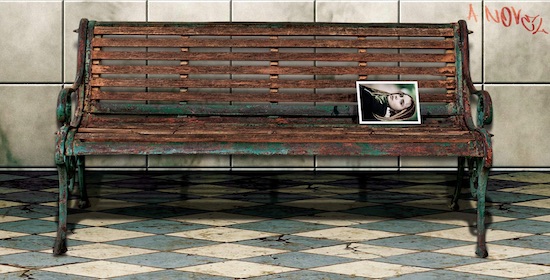Another great Irish writer. And another great Irish writer called Kevin. I’m thinking there are two things I should do with my life:
- Change my first name to Kevin.
- Get my wife to chase down her family rumour of a grandparent being Irish and obtain citizenship ASAP.
A druidic fog will then descend and suddenly the fairies arrive; my weak lines are then transformed into golden poetry.
Settle down now. Let’s talk about Kevin – Barry that is, his reputation white hot after the success of Beatlebone, his tale that imagines a screaming John Lennon cracking up on the West Coast of Ireland. He’s back with a new novel that has already made the Booker longlist and it’s about gangsters.
Maurice Hearne and Charlie Redmond are Corkmen, a couple of buffers in their fifties and past their best. They find themselves at the ferry terminal in Algeciras, a bit of a dump, and scan the crowds as they look for Maurice’s daughter. They are a pair of vaudeville villains; there’s something of Beckett’s Vladimir and Estragon about them as they josh and bicker; they have a significant back history. Barry gets in early and quickly ticks off any predictable comparisons with previous Irish greats. Joyce’s heaventree of stars is mentioned and is promptly undercut with some serious frivolity:
Whose line was that Maurice?
I believe it was the Bard, Charlie. Or it might have been Little Stevie Wonder.
A genius. Little Stevie.
They are a pair of faded dandies who “retain – just about – a rakish air”. They have “old weather on their faces” and aren’t fond of crusties – they call them crustaceans. You warm to them. You might imagine the guys as looking like Max Wall and Leo McKern in Godot but a carefully placed line about a clock coming down the stairs makes me see them quite differently. This is a nifty reference to an album title by Microdisney – Cork’s finest combo – and so I imagine Maurice and Charlie as resembling the leaders of the band, see them like the latter-day Cathal Coughlan and Sean O’Hagan, as caught during their recent temporary reformation. As Barry has it they have “an aura of brassy menace”.
The Andalucian setting here is detailed with slick precision: “the white apartments were clean as picked bone and appeared untenanted”. Many will have seen these. Maurice and Charlie have done well financially from drug deals but much of the money has gone. Here’s Maurice moaning about his wife Cynthia and her expenditure:
The fucken sofas she had going on? She was going to Copenhagen for the sofas.
There’s a real menace to the Pinteresque patter of the pair, it’s as if you’ve been collared on a (otherwise empty) late night train by a couple of belligerent drunks. Shifts from moments of laconic hilarity to ultra-violence are swift and unpredictable. Another of Coughlan’s vicious songs comes to mind – this time by his other band, The Fatima Mansions, the scabrous ‘Evil Man’. Maurice and Charlie are a piratical duo near the Barbary Coast and “their jauntiness has a cutlass edge”.
Barry is particularly good on faces. Cynthia, we learn, “was beautiful as she drove – the worms of concentration wriggled on her brow”. And, back in rural Ireland, we see a man who looks like a country auctioneer “with a sherried nose”. Then there is Cork, “a townful of hawky-looking dudes with sinister chins and dumpling noses.” You need to be careful in the pubs there: one is described as “an eyes-sideways-in-your-head job”. Barry is rigorous on his homeland more generally:
Fucking Ireland. Its smiling fiends. Its speaking rocks. Its haunted fields. Its sea memory. Its wildness and strife. Its haunt of melancholy. The way that it closes in.
Musical references abound. Maurice and Charlie have taste; they can’t be having Radiohead:
Never liked them. Whining bastards. And the amount of money the cunts are making? They should have the ukuleles out.
In tone Night Boat to Tangier shares something with the Pixies album Surfer Rosa: a lurching, crunching, Hispanic threat of heaviness, Spain with its “old, tatty charisma”. The band is duly referenced elsewhere. Barry’s laconic descriptions dazzle: at a psychiatric hospital we see an avenue lined with trees, larches that are parenthetically described thus – (primly erect, arrogant as surgeons). We are in high Nabokovian (picnic, lightning) territory here. Elsewhere we are told brilliantly “the last few taxis drifted as stoically as cows”. And in the ferry port we find “the quick gabbling ham-eater mouths are silky-greasy in the hard terminal light.” Finally in a detail common to the hell of such places:
There is crazy fucking denim everywhere.
Night Boat to Tangier is a hymn to Spain and Cork and SE Hinton and the loneliness of men who like Hank Williams and much more. Kevin Barry’s writing here has the brisk allusive power of those early Michael Ondaatje books like Coming Through Slaughter. There’s a similar pacing, lines as loaded and hidden as a landmine that call a sudden halting and then impact in the head with their dizzying fragments. You feel fragged. You are made to feel the pain of the pair, to empathize sometimes against your better judgement, just as in real life, and yet laugh too at their lunacy, their sad predicament. As with encounters with the staggeringly inebriated strangers you escape, enervated, a tad fried, and with a sigh of relief that theirs is not your life.
This novel is every bit as impressive and entertaining as Beatlebone. Put a punt on Barry for the Booker.
Night Boat to Tangier by Kevin Barry is published by Canongate


